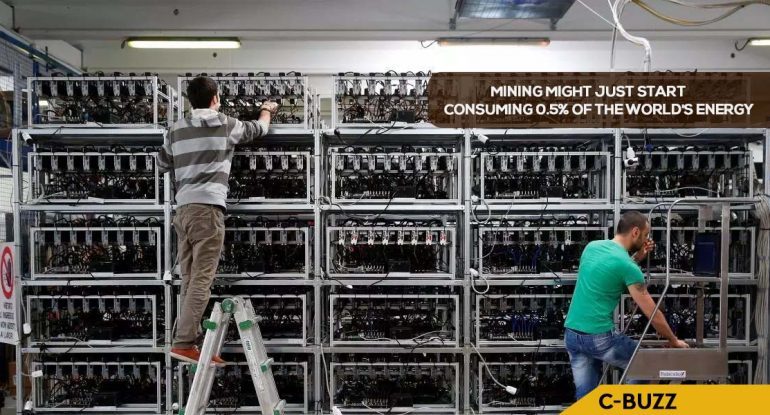The Bitcoin mining network of the world currently uses as

The Bitcoin mining network of the world currently uses as much electricity as the whole country of Ireland and is set to consume 0.5% of all the world’s electric energy by the end of this year, according to new calculations, which further suggest that the eventual energy consumption costs might just make mining profits go negative themselves.
The electricity demand comes from the computing power required to mine Bitcoin – the process of generating new units of the cryptocurrency by solving complex mathematical puzzles. These puzzles are designed to get more complicated as technology advances, thus requiring even greater computing power.
These figures come from a new commentary by Alex de Vries, published on May 16 in the journal Joule. De Vries, a financial economist and blockchain specialist, carefully worked through a number of known data points, including the number of bitcoin-mining computers made in 2017, the energy consumption of those computers and the minimum energy costs of cooling large facilities of tightly packed computers, among others to arrive at an absolute lowest bound for the energy consumption of the bitcoin network today: 2.55 gigawatts.
This is the first time that estimates of Bitcoin’s energy demands have been peer-reviewed and it adds considerable weight to the debate of addressing the environmental impact of the world’s most valuable cryptocurrency.
Certain details, like how many of these computers actually get made per year, or what tricks different mining operations use to keep them cool, are industry secrets, but de Vries worked around that secretiveness to find the data he needed for his calculation. Previous calculations by Mr de Vries have been used to predict how long it would take for Bitcoin energy consumption to be unsustainable.
Future?
At one point during Bitcoin’s rapid rise in late 2017, if the network’s growth had continued it would have required all of the world’s current energy production in order to support itself by 2020.
Various factors mean that this would never actually occur. However, Mr de Vries warns that the network could someday consume most of the world’s electricity.
To limit the impact of such energy consumption, some US states have already set restrictions around Bitcoin mining, with Plattsburgh becoming the first city in the US to ban crypto mining after its cheap electricity rates led miners to use the city as a base for their operations. De Vries believes that his estimate is important to determine the sustainability of cryptocurrencies and shaping policy around them and hopes his paper will be used to employ better-informed policy in this area.
If Bitcoin miners were a country, they’d rank somewhere between the 60th and 70th for consumed electricity — more than half the countries in the world. A major problem with this exponential growth on a finite space is that very soon all of them would run out of room for machines.
Rather than using a wind turbine to mine bitcoin to fund climate change research, it would all seem a lot less circular if mining Bitcoin is contributing to climate change prevention.
